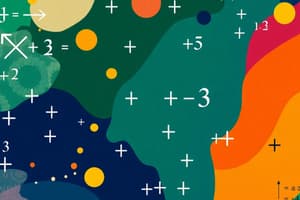Podcast
Questions and Answers
Which branch of mathematics primarily deals with variables and equations?
Which branch of mathematics primarily deals with variables and equations?
- Algebra (correct)
- Geometry
- Statistics
- Calculus
What is the correct order of operations in mathematics?
What is the correct order of operations in mathematics?
- Parentheses, Exponents, Multiplication and Division, Addition and Subtraction (correct)
- Multiplication, Division, Parentheses, Addition
- Exponents, Addition, Subtraction, Parentheses
- Addition, Subtraction, Multiplication, Division
Which concept is NOT a measure of central tendency in statistics?
Which concept is NOT a measure of central tendency in statistics?
- Median
- Range (correct)
- Mode
- Mean
What does discrete mathematics study?
What does discrete mathematics study?
Which topic is included in the study of calculus?
Which topic is included in the study of calculus?
Flashcards are hidden until you start studying
Study Notes
Overview of Mathematics
- Definition: The study of numbers, quantities, shapes, and patterns.
- Branches:
- Arithmetic
- Algebra
- Geometry
- Calculus
- Statistics
- Discrete Mathematics
Key Concepts
-
Arithmetic
- Basic operations: addition, subtraction, multiplication, division.
- Integers, fractions, decimals, and percentages.
-
Algebra
- Variables and expressions.
- Equations and inequalities.
- Functions and graphs.
- Polynomials and factoring.
-
Geometry
- Points, lines, angles, shapes.
- Theorems (e.g., Pythagorean theorem).
- Area, volume, and surface area calculations.
-
Calculus
- Concepts of limits, derivatives, and integrals.
- Applications in motion, area under curves, and optimization.
-
Statistics
- Data collection and analysis.
- Measures of central tendency (mean, median, mode).
- Probability and distributions.
-
Discrete Mathematics
- Study of countable, distinct objects.
- Topics include logic, set theory, combinatorics, and graph theory.
Mathematical Principles
- Order of Operations: PEMDAS (Parentheses, Exponents, Multiplication and Division, Addition and Subtraction).
- Properties of Numbers:
- Commutative, associative, distributive properties.
- Identity and inverse elements.
Problem-Solving Strategies
- Understand the problem and gather relevant information.
- Break the problem down into manageable parts.
- Establish a plan and execute it step-by-step.
- Review and verify the solution.
Applications of Mathematics
- Used in various fields: engineering, physics, economics, computer science, biology.
- Essential for data analysis, modeling, and decision-making.
Tips for Studying Math
- Practice regularly to reinforce concepts.
- Work on a variety of problems.
- Seek help when concepts are unclear.
- Use visual aids like graphs and charts to understand complex ideas.
Overview of Mathematics
- Mathematics involves the study of numbers, quantities, shapes, and patterns.
- Major branches include:
- Arithmetic: Fundamental operations with numbers.
- Algebra: Involves variables and operations to form equations.
- Geometry: Examination of shapes, sizes, and the properties of space.
- Calculus: Analyzes change through derivatives and integrals.
- Statistics: Focuses on data collection, analysis, and interpretation.
- Discrete Mathematics: Studies distinct, countable structures.
Key Concepts
- Arithmetic: Concerns operations like addition, subtraction, multiplication, and division, including various forms of numbers such as integers, fractions, decimals, and percentages.
- Algebra: Uses symbols and letters to represent numbers and express relationships through equations, functions, and graphs.
- Geometry: Centers on points, lines, angles, and shapes, incorporating theorems like the Pythagorean theorem, and calculates area, volume, and surface area.
- Calculus: Deals with limits and continuity, derivatives to determine rates of change, and integrals for calculating areas under curves.
- Statistics: Encompasses collecting, analyzing, and interpreting data while applying measures of central tendency (mean, median, mode) and understanding probability distributions.
- Discrete Mathematics: Focuses on countable objects, covering areas like logic, set theory, combinatorics, and graph theory.
Mathematical Principles
- Order of Operations: PEMDAS dictates the sequence for evaluating expressions: Parentheses, Exponents, Multiplication and Division (left to right), Addition and Subtraction (left to right).
- Properties of Numbers: Includes commutative (a+b=b+a), associative ((a+b)+c=a+(b+c)), distributive (a(b+c)=ab+ac), and identifying identity (a+0=a) and inverse elements (a+(-a)=0).
Problem-Solving Strategies
- Analyze the problem thoroughly and obtain necessary information.
- Decompose the problem into smaller, more manageable segments.
- Formulate a clear plan to tackle each part step-by-step.
- Review the final solution to ensure accuracy and completeness.
Applications of Mathematics
- Mathematics is crucial across numerous fields such as engineering, physics, economics, computer science, and biology.
- Plays a vital role in data analysis, modeling real-world scenarios, and enhancing decision-making processes.
Tips for Studying Math
- Regular practice is essential for solidifying understanding of concepts.
- Engage with a diverse range of problems to ensure comprehensive mastery.
- Seek assistance or clarification whenever concepts become confusing.
- Utilize visual tools like graphs and charts to simplify and clarify complex mathematical ideas.
Studying That Suits You
Use AI to generate personalized quizzes and flashcards to suit your learning preferences.





